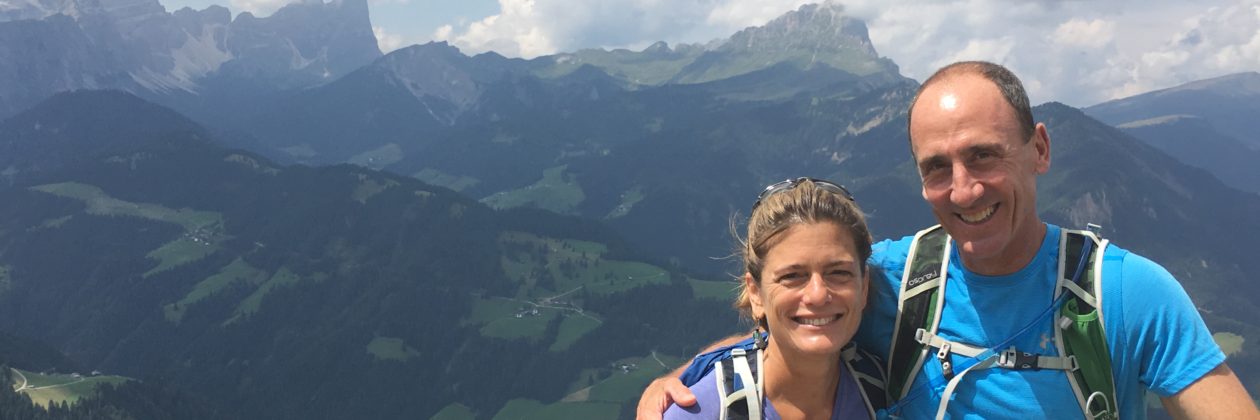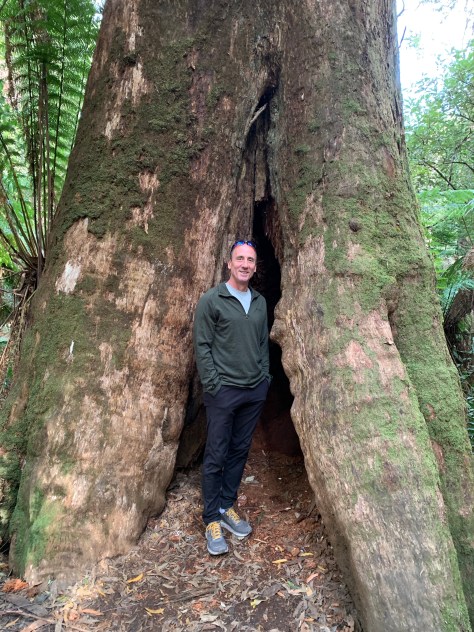
Dignified Sydney 
Hipster Melbourne
If Melbourne is the twenty-something hipster leaping head first into the world, Sydney is the sober forty-year-old with a couple of kids, a good job and a staid outlook on life. As our terrific host at the Chalet in the Blue Mountains described it, “Melbourne has style, but Sydney has substance.”
It is hard not to fall in love with both cities. They affect my outlook the way music can set a mood. Crank up Ed Sheeran and I’m poppin’ off like a teenager in love for the first time (my kids will hate that image), but dial up Sting and I’m all deep, introspective sophistication. So too, take a walk around Sydney and all I can think about is where to dine with a fine bottle of Cabernet. Jump on the tram in Melbourne, especially St. Kilda, our current location, and I’m feeling a tall one with my homies (that would be Melissa) in a sidewalk café.

Melbourne bridge over the Yarra 
Melbourne skyline 
Old Melbourne
We’ve shared about our first sojourn in Sydney, a truly world-class city, but now we’re back in Melbourne, for the second time. We were here for a couple of nights last week before we cruised our silver Camry into the great wide open of the Great Ocean Road. Thanks to AirBnB, we’ve plopped our bags in a studio apartment four floors above the action in St. Kilda, a beach community about 15 minutes from the CBD – Central Business District.

Enter our apartment through a narrow corridor that doubles as a kitchenette and you open into a spacious, sunny room with light oak floors, two six foot tall windows that look out on the Melbourne skyline, a tiny, but functional bath and a double bed plopped in the middle of the room. Add in the twelve-foot ceilings and a small table with two chairs and I’m full on Hemingway, writing the great American novel. The one drawback is sleep. It’s hard to get with so much activity going on outside the window. First-world problem.
Let me step in to paint a more accurate picture. As usual, Don has done everything he can to make me comfortable. Unfortunately, that means that I got the one set of earplugs left by our AirBnB host, while Don has lain awake with the late-night bars, tram bells, and screaming mufflers on the street below (who plays an organ at four in the morning?). He says he doesn’t need earplugs, but I know better. That said, we’re getting ready to attend our first – and last? – AFL (Australian Football League) game at Marvel Stadium. Something tells me the Aussies are supportive (raucous) fans.

Melbourne is made up of unique neighborhoods, and we have tramped from one end of this city to another. It’s been hard to find good food close by, but we zeroed in on two amazing experiences. One was a tiny creperie we stumbled upon in the CBD, the other the South Melbourne Market. At the creperie, we fell head over heels with our adorable Parisian waitress and ordered the best galette, best dessert crepe, and a small bottle of cider (it was only 5.5% and it was past noon), at her insistence. She took the plate from the table just as I was about to put my face in it and lick it. At the market, we ate fresh veggies and smoked salmon at a stall surrounded by a smorgasbord of continental cuisines. South Melbourne is a little nicer than the equally extensive Victoria market to the north, so we also enjoyed a much-needed pedicure (me) and haircut (Don).

South Melbourne Market 
Repurposed for an H&M 
Creperie lunch
No one would hire us as travel guides, because we more or less “feel” our way around a big city, but it always seems to work out. Our second day in Melbourne, our peripatetic path took us through the Botanic Gardens, over to the Public Library with its newly renovated reading room and huge dome, to Federation Square for sushi and a street performance by a Cirque de Soleil acrobat who hung dangerously off a tall pole being held by four strangers he pulled out of the crowd. Having seen the signs for April’s Comedy Festival, we let a young person direct us to her two picks for the evening. One was a hilarious show, Judith Lucy vs. men, the other an improv/slapstick/burlesque show where, among other things, Don got a lap dance by a gender-fluid individual. They slapped “hugh jackman” on my shirt, but never got around to using it. Top all this off with two outdoor swims at the Aquatic Center, the crowds going wild in the (empty) stands, and we’re having fun.

Drinks on a floating bar 
Federation Square 
Melbourne Library 
Queen Victoria Market 
Empty stands, big dreams
Don again. We often start these entries on one day and finish them a few days later, as is the case now. We packed up our stuff and left Melbourne on Easter Sunday, flying to Sydney for our last few days before returning home to Seattle for a spell. After a few rough nights of sleep in St. Kilda, arriving at our quiet, seventh floor flat in Surry Hills, Sydney and being warmly greeted by our host, Pete, felt like checking into the Ritz. I started this entry with a comparison of Melbourne and Sydney. Now that I’m back in Sydney, I think that comparison is quite apt. I must admit that as much as I romanticize being that young hipster plunging into the world, drinking beers at the AFL game, joining in the chorus of inebriated sing-alongs at the Irish Bar across the street, I am truly glad to be back in Sydney.
I am curious what it will feel like to walk into my own house after three months, how it will feel to sleep in my own bed. For over 100 days, we have not stayed in the same place more than three nights. We have not fully unpacked our suitcases. We have worn the same clothes. For the last month, the only shoes I have worn are my tennis shoes. For over 100 days we have not been cross with one another, moped about feeling sorry for ourselves, felt down or depressed, or worried about missing an appointment or making someone angry. For over 100 days we have not worried about having nothing to do or too much to do. For over 100 straight days, we have held hands, kissed each other, clinked our glasses in a toast to everything and nothing, said “I love you” at odd times, and filled up our time standing witness to impossibly beautiful things to the point that virtually everything reflected something impossibly beautiful.

I have to admit that I am ready to swap out for some new clothes, but other than that, I can’t recall another time in my life that moved with such ease and grace, that was filled with such equilibrium, that felt like, and actually was, as full as it could be.
It seems fitting to close out the first part of this sabbatical singing:
Is this the real life?
Is this just fantasy?
Caught in a landslide
No escape from reality
Open your eyes
Look up to the skies and see
I’m just a poor boy, I need no sympathy
Because I’m easy come, easy go
A little high, little low
Anyway the wind blows, doesn’t really matter to me, to me
































































































































